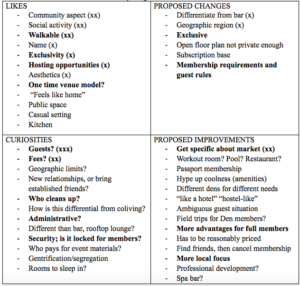For the evaluate mode, we conducted a focus group. We ended up getting a wide variety of students within our scope (all seniors and 2 juniors who had worked and lived in cities). When choosing people to invite I intentionally invited one person who I knew would not be interested in our idea and one who would be open to it. This ended up being very helpful because my friend who wouldn’t necessarily become a member of The Den had great feedback and constructive criticism – she pointed out flaws that I would not have caught because I am generally more open than her to these kinds of things.
During the test-run focus group in class, we noticed that we asked too many yes or no questions resulting in members feeling inadequately guided. We changed moderators for our official focus group and edited our moderator’s guide to encourage more conversations. One thing we found very helpful in getting feedback was having our audience write down their thoughts and questions before we opened the floor to questions and comments. This allowed people’s gut reactions to be cataloged and called on later, creating a more well-rounded focus group. In the same vein, for some questions that were more important to The Den, we asked each person to give a comment to make sure everyone felt as though they could voice their opinions.
One of the major downfalls I wanted to avoid in the focus group was one I noticed in the test focus group. When I asked questions or voiced an opinion that differed from the group’s, instead of thanking me for my contribution, they justified and defended their product. I was glad that we avoided this because we wanted to ensure everyone felt comfortable providing feedback. That being said, it was a difficult feat – one of the focus group members had the same critique of our product over and over again which we could have defended, but instead we thanked him for his opinion and guided the conversation to the next person’s comment.

The focus group helped us immensely because while there were many different critiques, we saw a pattern emerge – we needed to be more specific about The Den’s logistics. People were concerned about what the geographic radius for members would be, who would clean the event spaces, how many non-members were allowed and how often, what the pricing model was like, and more. We were able to consolidate these findings because we took notes during the focus group and had the audience fill out a feedback grid throughout the focus group. Moving forward, we will have to continue meeting as a group to agree upon the logistics.